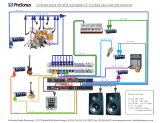
4
IMPORTANT
WARNINGS
SAFETY PRECAUTIONS
Before connecting and using this product, read the instructions provided in this manual carefully and keep it for future reference.
This manual is an integral part of the product and it must accompany it even in the case of changes of ownership, so that the new
owner is aware of the method of installation and use and all safety warnings. Incorrect installation and use of the product shall relieve
RCF S.p.A. of any and all liability.
CAUTION: to prevent the risk of flames or electric shock, do not ever expose this product to the rain or humidity.
1. All warnings, in particular those relating to safety, must be read with special attention, as they contain important information.
2. MAIN SUPPLY FROM THE MAINS
- The supply voltage of the device is sufficiently high to constitute a risk of electric shock to persons: never
install or connect the device with the power supply cable plugged into the mains.
- Before powering this product, make sure that all connections are correct and that the voltage of your mains
supply matches the value on the device data plate; if this is not the case, please contact an RCF dealer.
- The metal parts of the device are earthed via the power supply cable.
- A device with CLASS I construction must be connected to the mains socket with a protective earthing
connection.
- Make sure that the power supply cable of the device cannot be stepped on or crushed by objects, to make
sure it remains intact and in perfect working order.
- To avoid the risk of electric shock, never open the device: there are no parts that can be used by the user
inside.
3. Do not allow objects or liquids to penetrate the product, as this may cause a short circuit. The device must not be exposed to
dripping or splashing water; no naked flame sources (e.g. lighted candles) and no objects filled with liquid (e.g. vases) must be
placed on top of the device.
4. Do not perform any work / modifications / repairs except for those expressly described in this manual. Contact an authorised
service centre or highly qualified personnel when:
- the device is not working (or is working abnormally);
- the power supply cable has been seriously damaged;
- objects or liquids have penetrated the device;
- the device has undergone major knocks.
5. If this product is not used for long periods of time, unplug the power supply cable from the mains.
6. If the product releases abnormal odours or smoke, turn off the power immediately and unplug the power supply cable.
7. Do not connect this product to other devices and accessories not envisaged. Do not try to hang this product using elements
that are not designed or suitable for this purpose. To avoid the risk of falling, do not stack multiple units of this product, unless
this option is expressly specified in the instruction manual.
8. RCF S.p.A. strongly recommends that the installation of this product be carried out only by professional
qualified installers (or specialised installation companies) able to do it properly and to certify installation in
accordance with the applicable regulations in force. The entire audio system must comply with the applicable
rules and regulations regarding electrical systems.
9. Stands and Carts
Where envisaged, the product should only be used on carts or stands recommended by the manufacturer. The device-stand /
device-cart assembly should be moved with the utmost care. Sudden stops, excessive pushing force and uneven or tilted floors
could cause the assembly to overturn.
10. Hearing loss
Exposure to high sound levels can cause permanent hearing loss. The sound pressure level dangerous to one’s hearing varies
greatly from one person to another and depends on the duration of exposure. To avoid potentially dangerous exposure to high
sound pressure levels, anyone who is exposed to these levels must use adequate protection; when a transducer capable of
producing high sound levels is in use, ear plugs or protective headsets must be worn. See the technical instruction data to find
out the maximum sound pressure levels that the speakers are capable of producing.
11. Place the product away from heat sources and ensure adequate air circulation all around.
12. Do not overload this product for extended periods of time.
13. Never force the controls (buttons, knobs, etc.).
14. Do not use solvents, alcohol, petrol or other volatile substances to clean the external parts of the unit; use a dry cloth.
15. Do not point microphones near and in front of the speakers, so as to avoid any feedback (“Larsen effect”).
NOTE ON CABLES FOR AUDIO SIGNALS
To prevent the occurrence of noise on the cables that carry signals from the microphones or on the line (for example 0 dB), use only
screened cables and avoid laying them in the vicinity of:
- equipment that produces strong electromagnetic fields;
- cables from the power mains;
- speaker lines.
RCF S.p.A. thank you for buying this product, which was made in order to ensure reliability and high performance.
ENGLISH






















